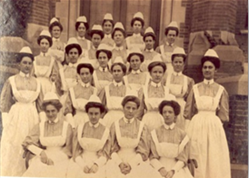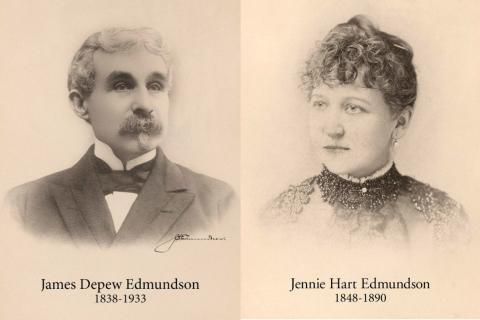
School of Nursing
Your generosity matters!
Council Bluffs' First Hospital
When Council Bluffs was still a gateway to the "Wild West" in 1884, a group of women banded together to live their faith and help people less fortunate than themselves. This
"Faith Band" gave food baskets to the poor, tended to the sick, and taught sewing and cooking skills to young girls.
After a young woman was forced to deliver her baby in the city jail (the only shelter available), members of the Faith Band knew they faced a more challenging mission: to open a hospital where anyone in need of medical care would be welcome.
In 1886, the Faith Band was incorporated into the Women's Christian Association (WCA). That same year, they opened Council Bluffs' first hospital in a five-room cottage at 312 Williams Street.
By 1887, the hospital had outgrown its cottage, so the WCA leased the house owned by P.J. McMahon, M.D., on the northwest corner of Sixth Avenue and Ninth Street. This was only the first of many expansions designed to meet the growing healthcare needs of southwest Iowa. Funds for the hospital's daily expenses and patient meals came from cash and food donations. As medicine progressed, so too did the services offered by hospitals. Hospitals could no longer be run by one untrained woman who was a nurse, cook, and maid to a handful of patients. Nursing would become a respected career after the hospital's School of Nursing opened in 1889.
First Nursing School in the West
Young, single girls enrolled in the apprenticeship program at the first nursing school west of the Mississippi River. Admission requirements included good moral character and the ability to read and write.
The program included hands-on training from older women who didn't have much more experience than their students did. Physicians took turns giving lectures, and students were allowed to observe operations in the surgical theatre.
History
1889-1997

The Women’s Christian Association was organized in 1884 and incorporated in 1886 when the hospital was founded. Early activities of the group include visiting the sick, feeding the poor and gathering for regular prayer meetings. Although the minutes of the first years of the organization are sketchy, it is believed that the School of Nursing had its beginnings during the period of 1887 to 1889. The first time a name could be linked to a certificate was in 1891. The program then became a two-year program.
Early requirements for a student nurse were a certificate of good moral character, a fair knowledge of English grammar, reading and writing. Each student also had to bring with her a napkin ring, black silk stockings and plain, unadorned underwear. Lectures were given twice a week by physicians and were attended by all first and second-year students. After completion of the two-year course, students were examined by a Board of Physicians on their knowledge and skills.

One of the most notable characteristics of the Jennie Edmundson School of Nursing was its tradition of commitment to the community and the world. Graduates answered the call to serve their country in both World Wars. In WWI, Dr. Donald McCrae led a group of Jennie Edmundson nurses and physicians to France, where they formed Unit K. During WWII, the School was accepted as part of the U.S. Cadet Corps established by the Bolton Act and helped prepare nurses for wartime duty.
The School continued to grow in all ways since its earliest days. Records show a total of 1777 nursing students graduated from the Jennie nursing program. Jennie nurses live in almost all 50 states and in some foreign countries. The dormitory, built in 1915, was torn down in 1979, and fully furnished apartments close to the hospital were utilized for student housing.
The School has been continuously accredited by the National League for Nursing since 1959. The program was shortened to three academic years in 1968, and in later years began attracting more non-traditional students. The number of male students increased in later years when a nursing career became more attractive financially and also offered areas where a nurse could grow professionally.
Jennie Hart Edmundson
The central figure in the continued growth and development of the hospital was James D. Edmundson, an attorney, teacher and real estate broker. He married Jennie Way Hart, the only daughter of a local surgeon, in 1871. They were a popular, happy couple with many friends and interests. Jennie suffered a spinal injury in 1878 that confined her to bed until her death in 1890.
In the early 1900s, the WCA asked J.D. Edmundson for a loan for further expansion. He agreed to two separate loans for $40,000 each to be used over time. He later decided that the loans would become a gift if the hospital was named in honor of his beloved wife. The WCA purchased the land at the hospital's present location in 1905, and construction began in September of that year.
Jennie Edmundson Memorial Hospital (JEH) opened its doors on February 12, 1907. Patients were moved by carriage and ambulances to the new facility.
J.D. Edmundson's support continued with a generous gift of $225,000 upon his death in 1933. To honor a request from Mr. Edmundson, a bouquet of roses is placed beneath Jennie's portrait each year on her birthday.

A Lasting Legacy
In the ever-changing field of healthcare, adaptability is a cornerstone to success. In May 1994, Jennie Edmundson Hospital became a corporate affiliate of Nebraska Methodist Health System. This affiliation has allowed JEH to work with other providers in Iowa and Nebraska to enhance regional access to specialized healthcare services. In December 1994, the Jennie Edmundson Foundation was formed to support that hospital and our community.
Jennie Edmundson Hospital is fully accredited by the Joint Commission on the Accreditation of Healthcare Organizations and is a member of the Iowa Hospital Association, American Hospital Association and VHA Mid-America.
Although the years have brought change, the goal of the Faith Band and WCA remains the same as in 1884: to provide complete, compassionate medical care. With foresight and dedication, Jennie Edmundson Hospital will continue offering that care for generations.
